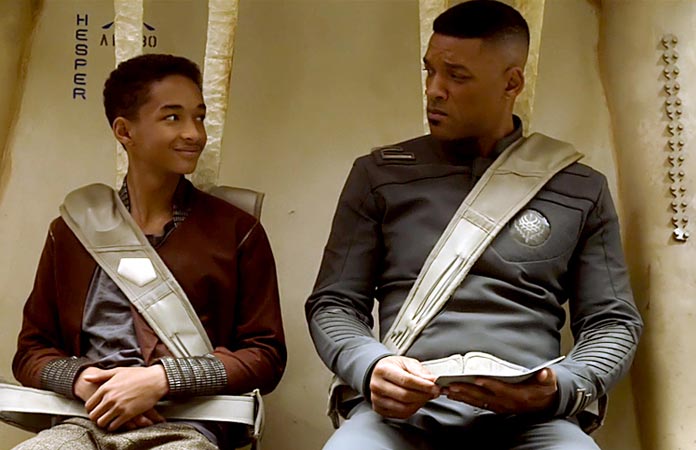Movie Review: After Earth
Published on June 6th, 2013 in: Movie Reviews, Movies, Reviews, Science Fiction |If you’ve been to any of the tentpole genre movies that have come out this summer (or even in the last year), you’ve probably seen ads for After Earth. This sci-fi vehicle features real-life father and son Will and Jaden Smith as Rangers who get stranded on a hostile Earth in the distant future. What you may not know, because the marketing downplayed it, is that it was directed and co-written by M Night Shyamalan, who was once lauded as a brilliant auteur but who has fallen into disfavor.
I never have been in the Shyamalan-hate camp. Like most people who saw it, I enjoyed The Sixth Sense, but I also enjoyed his other movies that I’ve seen. Signs and Unbreakable put a novel twist on the alien-invasion movie and the superhero movie, respectively, even if looking back on it, the big reveal in Unbreakable is kind of problematic. The Village had an interesting take on the post-9-11 security era, even though you rarely see that discussed. I even have an unreasonable love for the much-maligned Lady in the Water, although admittedly I’m a myth-geek who first encountered Joseph Campbell in grade school.
With all of that said I will admit that I haven’t yet seen The Last Airbender, The Happening, or Devil, which have as much to do with the sinking of Shyamalan’s stock as his earlier work. And After Earth is unlikely to be the movie that rehabilitates his reputation.
As you might imagine from the trailer, in the film, humans have long since been forced to abandon Earth. On their new home of Nova Prime, they are hunted by vicious creatures called ursas, who can’t see but who can smell human fear hormones. Will Smith plays Cypher Raige, a Ranger who is invisible to the ursas because he has gotten beyond his fear of them. He has one last mission to fly before retirement, and he takes his troubled son Katai with him. When their transport crashes on earth, they are the lone survivors, and Cypher is badly injured. Katai has to cross 100 kilometers by himself to retrieve a beacon that will bring help, dodging both deadly local animals and an ursa that was on the transport. Fortunately, technology allows Cypher to communicate with Katai, to see what’s going on around him, and to track his vitals.
Let me be clear: there’s some serious heavy lifting, acting-wise, done by both Smiths. For the majority of the movie, it’s just the two of them. The fact that they must communicate over distances to survive, and to heal the rift between them, makes for an interesting juxtaposition of intimacy and separation. The contrast between the remains of the ship and the open wilderness provide a simultaneous sense of claustrophobia and agoraphobia. I don’t think I’ve ever seen Will Smith pay anyone quite this hard nosed and buttoned up, and Jaden Smith proves himself to be a promising talent.
Nor is the acting the only good thing about the film. If you enjoy the tone of Shyamalan’s movies, After Earth does not disappoint. The landscapes are beautiful, as many reviewers have already remarked. The man-made elements are also visually interesting, with innovative architecture and machines which seem inspired by natural items such as honeycombs and bones. The score is also worth mentioning, with acoustic piano melodies helping draw the sci-fi story back into the realm of human emotion.
Unfortunately, After Earth is critically lacking in an important area. There is character development, as you might imagine—Katai survives by letting go of fear in the same way that Cypher does, and Cypher is able to connect with Katai emotionally. All of this is very predictable. It would have been nice if the emotional growth that they’d been given was more nuanced or original. Cypher also doesn’t quite sell me on the uselessness of fear, but that’s an essay unto itself.
Even the internal conflict is something we’ve seen from Shyamalan before. Katai is struggling with guilt over the death of his older sister, who was killed by an ursa. In his world, it seems like a plausible and believable motivation . . . until you remember the psychologist in The Sixth Sense, the priest in Signs, and the motel owner in Lady in the Water, all of whom dealt with a sense of failure over the death of someone else.
At the end of the day, I’m sorry to say that After Earth is kind of forgettable. It’s not a bad way to spend 100 minutes, but marketed more as “somewhat arty Shyamalan genre film,” it might have been better received than in the attempt to market it as a summer sci-fi thriller.
My hope is that After Earth might still represent a step back toward redemption for Shyamalan. More importantly, I hope it opens the door even a crack further for sci-fi that’s not based on previous material or part of a franchise, sci-fi that tweaks the rules of cinema, and sci-fi that’s anchored by actors of color. If all of that can happen, then the Raiges’ return to Earth will have been a trip worth making indeed.

Time limit is exhausted. Please reload the CAPTCHA.